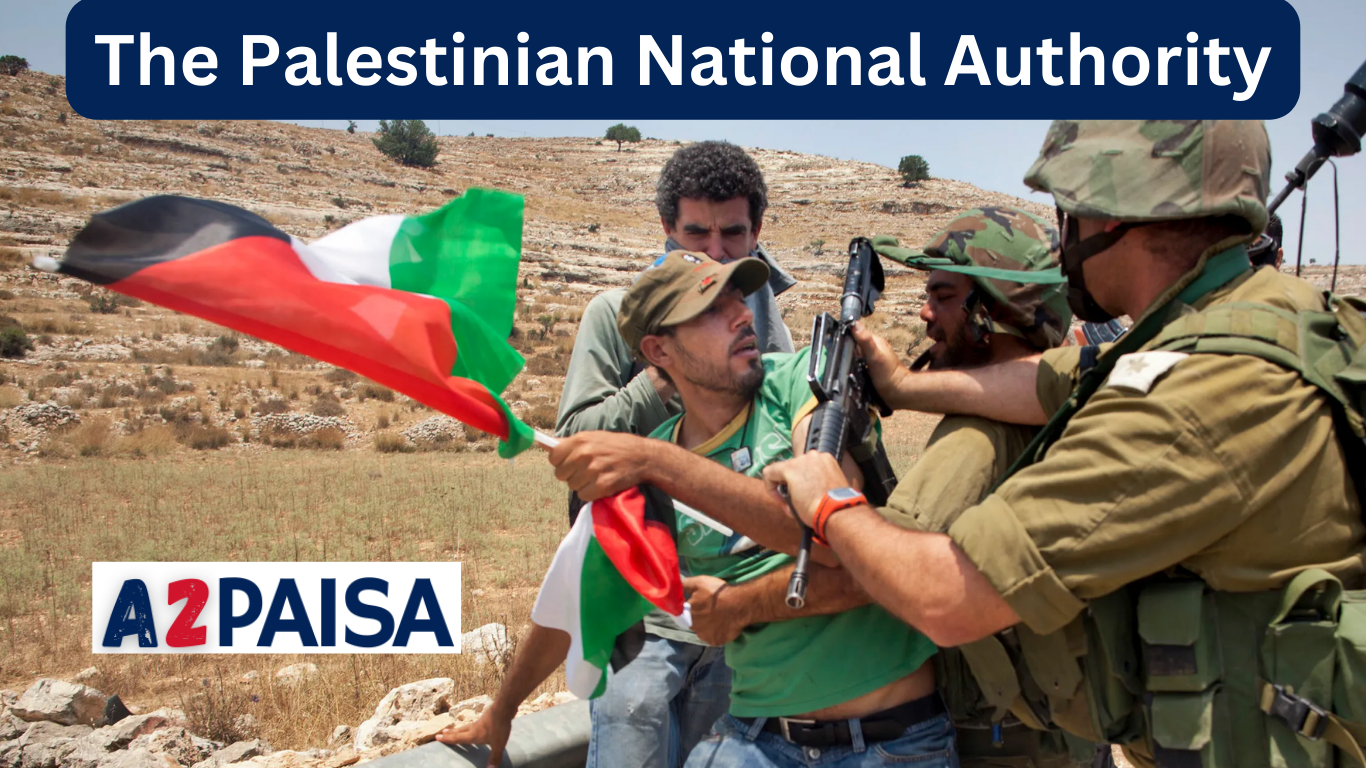Understanding the Palestinian National Authority (PA)
The Palestinian National Authority (PA), also known as the Palestinian Authority, is a governing body established in 1994 as part of the Oslo Accords peace agreements between Israel and the Palestine Liberation Organization (PLO). Its purpose was to pave the way for an independent Palestinian state.

What it does IN Palestine: Palestinian National Authority
- Exercises partial civil control over specific areas of the West Bank, known as Area A and B, as outlined in the Oslo Accords.
- Oversees various aspects like education, healthcare, and social services in these areas.
- Manages foreign relations and represents the Palestinian people on the international stage. (It is important to note that this claim to representation is contested by other Palestinian groups, particularly Hamas.)
Challenges it faces: Palestinian National Authority
- Limited control: The PA does not have full control over the territories it governs. Security in Area C remains under Israeli control, and the Gaza Strip is currently controlled by Hamas, a different Palestinian political faction.
- Internal divisions: The PA has faced criticism for internal divisions and its perceived lack of transparency and accountability.
- Peace process stalemate: The envisioned path towards an independent Palestinian state through negotiations with Israel has stalled.
Famous quotes: Palestinian National Authority
- “The two-state solution is the only viable solution.” – Mahmoud Abbas, President of the Palestinian National Authority (This quote highlights the PA’s official position on achieving Palestinian statehood)
- “Peace is not the absence of conflict. It is the ability to handle conflict peacefully.” – Yasser Arafat, Former President of the Palestinian National Authority (This quote emphasizes the importance of peaceful conflict resolution)
- “Peace is the only way to resolve this conflict, and it is the only way to build a future for all our children.” – Yasser Arafat, Former President of the Palestinian Authority
- “The two-state solution is the only viable solution to the Israeli-Palestinian conflict.” – Jimmy Carter, Former US President
What is the PA?
The PA emerged from the Oslo Accords, a series of interim agreements signed between Israel and the Palestine Liberation Organization (PLO) in the early 1990s. These accords aimed to create a framework for a future Palestinian state.
The PNA was envisioned as a temporary governing body for the West Bank and Gaza Strip until a final peace agreement could be reached. It exercises partial civil control over parts of the West Bank, divided into Areas A, B, and C, as defined by the Oslo Accords.
It’s important to note that the PNA does not control the Gaza Strip since 2007, following the Hamas takeover. However, the PNA still claims the Gaza Strip as part of a future Palestinian state.
Key Points to Remember: Palestinian National Authority
- Established in 1994 as a result of the Oslo Accords.
- Exercises partial civil control over parts of the West Bank.
- Does not control the Gaza Strip since 2007.
- Fatah, a political party, is the dominant force within the PNA.
PNA vs. Hamas: Palestinian National Authority
Both the PNA and Hamas are Palestinian political entities, but they differ significantly in their ideology and approach to the Israeli-Palestinian conflict.
- PNA: Led by Fatah, a secular party that advocates for a two-state solution through negotiations with Israel.
- Hamas: An Islamist group that considers all of historical Palestine, including Israel, as Islamic land and seeks its liberation through armed resistance.
Palestinian Authority Official Website: Palestinian National Authority
Palestinian Government vs. Hamas:
While the PNA is internationally recognized as the legitimate governing body of the Palestinian people, Hamas controls the Gaza Strip and maintains a separate administration. This creates a complex situation with two rival Palestinian authorities.
Type of Government in Palestine: Palestinian National Authority
The Palestinian territories are under a semi-presidential system, where the president is both head of state and head of government. However, the effectiveness of this system is often hindered by internal divisions and the ongoing Israeli-Palestinian conflict.
PNA vs. PLO: Palestinian National Authority
The PLO is the broader umbrella organization representing the Palestinian people worldwide. It acts as the sole legitimate representative of the Palestinian people and includes various political factions, including Fatah. The PNA, on the other hand, is the administrative body established to govern parts of the Palestinian territories.
Palestinian Authority Leader: Palestinian National Authority
The current leader of the PNA is Mahmoud Abbas, who serves as both President and Chairman of the PLO Executive Committee.
Effectiveness of the Palestinian Government:
The effectiveness of the Palestinian government is a complex and contested issue. The PNA faces numerous challenges, including:
- Limited control over territory: Due to the Oslo Accords and the Israeli occupation, the PNA’s control is restricted in many areas.
- Internal divisions: Political divisions and factionalism within the Palestinian leadership weaken the government’s ability to function effectively.
- Economic difficulties: The Palestinian economy is heavily dependent on foreign aid and faces significant challenges like unemployment and poverty.
Despite these challenges, the PNA continues to provide essential services to the Palestinian population in the West Bank, such as education, healthcare, and social welfare.
Understanding the PNA and its complexities is crucial for anyone seeking to gain a deeper understanding of the Israeli-Palestinian conflict and the ongoing quest for peace in the region
Palestinian Authority vs. Hamas: Palestinian National Authority
- Hamas is a Palestinian Islamist political party and militant group that emerged in the late 1980s.
- Unlike the PA, which operates under the Oslo Accords, Hamas opposes the agreements and advocates for armed resistance against Israeli occupation.
- In 2007, Hamas won the Palestinian legislative elections and took control of the Gaza Strip, leading to a de facto split between the PA (governing the West Bank) and Hamas (governing Gaza).
- While both the PA and Hamas seek an independent Palestinian state, they have significant ideological and political differences.
Type of Government: Palestinian National Authority
- The PA operates under a semi-presidential system, with a president as head of state and a prime minister leading the government.
- However, the effectiveness of this system is often debated due to various factors, including the ongoing Israeli-Palestinian conflict and internal political divisions.
Palestinian Authority vs. PLO: Palestinian National Authority
- The PLO is a broader umbrella organization representing the Palestinian people worldwide. It was established in 1964 and served as the key negotiator in the Oslo Accords.
- The PA, on the other hand, is the administrative body responsible for governing the Palestinian territories under its control.
FAQs: Palestinian National Authority
Does the US recognize the Palestinian Authority?
- No, the US does not officially recognize the Palestinian state, although it maintains diplomatic relations with the PA.
Is the Palestinian Authority recognized by the UN?
- The UN General Assembly granted the State of Palestine non-member observer state status in 2012.
Does the Palestinian Authority issue passports?
- Yes, the PA issues Palestinian passports, but their recognition and validity vary by country.
Where does the Palestinian Authority get its money from?
- The PA relies on foreign aid, taxes, and customs duties for its funding.
Why does the US not recognize Palestine?
- The US position is based on concerns about regional stability and the need for a negotiated peace process between Israel and the Palestinians.
Does Israel recognize the Palestinian Authority?
- Israel recognizes the PA as a governing body within the framework of the Oslo Accords, but it does not recognize a Palestinian state.
Is the Palestinian Authority the same as Palestine?
- The PA is the governing body, while Palestine refers to the geographical territory and the aspirations for an independent Palestinian state.
Who lived in Palestine before Israel?
- The land now known as Palestine has been inhabited for millennia, with various groups including Canaanites, Israelites, Romans, Arabs, and Ottomans leaving their mark on the region.
What was Palestine before it was Palestine?
- The name “Palestine” has been used for the region since Roman times, although the specific boundaries and political entities have changed throughout history.
What countries legally recognize the State of Palestine?
- As of February 2024, 138 countries recognize the State of Palestine.
Which countries do not recognize Israel?
- A small number of countries, primarily in the Middle East and North Africa, do not recognize Israel.
Does the UK recognize Palestine as a state?
- Yes, the UK recognized the State of Palestine in 2014.
Does the US recognize the Palestinian Authority?
- No, the US does not formally recognize the PA as a government, but it does maintain diplomatic relations with it.
Is the Palestinian Authority recognized by the UN?
- Yes, the UN General Assembly granted the PA “observer state” status in 2012.
Does the Palestinian Authority issue passports?
- The PA issues travel documents, but they are not recognized as passports by all countries.
Where does the Palestinian Authority get its money from?
- The PA’s budget relies heavily on foreign aid, primarily from the US, European Union, and Arab countries.
Why does the US not recognize Palestine?
- The US cites concerns about Israeli security and the need for a negotiated peace settlement as reasons for not recognizing Palestine.
Does Israel recognize Palestinian Authority?
- Israel recognizes the PA as a governing body within the framework of the Oslo Accords, but it does not recognize Palestinian statehood.
- Is Palestinian Authority the same as Palestine?
- No, the PA is the governing body, while Palestine refers to the geographic region and its people.
Who lived in Palestine before Israel?
- The land now referred to as Palestine has been inhabited by various groups throughout history, including Canaanites, Israelites, Jews, Christians, and Muslims.
What was Palestine before it was Palestine?
- The term “Palestine” has been used for centuries to refer to the region, but its specific boundaries have changed over time.
What countries legally recognize the State of Palestine?
- As of February 2024, 138 UN member states recognize the State of Palestine.
Which countries do not recognize Israel?
- Only a handful of countries, including Iran and Syria, do not recognize Israel.
Does the UK recognize Palestine as a state?
- Yes, the UK recognized the State of Palestine in 2018.




